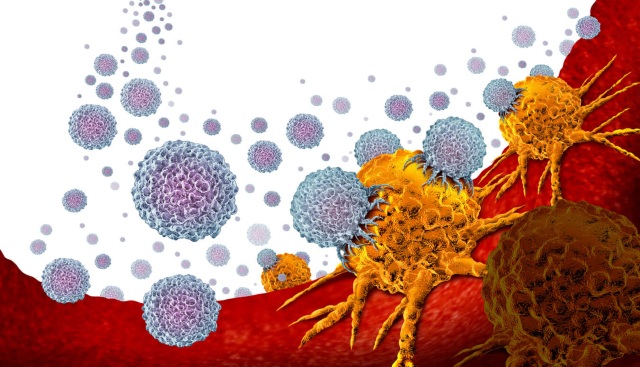Breath Test Predicts Immunotherapy Response to Mesothelioma

Researchers in the Netherlands are touting a novel breath test for mesothelioma patients to better predict response to the immunotherapy combination of nivolumab and ipilimumab that was approved recently for first-line treatment of the disease.
They believe exhaled breath analysis using electronic technology – known as eNose – can differentiate between responders and nonresponders before treatment begins, saving many patients from unnecessary side effects.
There currently are no biomarkers for mesothelioma that can accurately predict the effectiveness of these types of immunotherapy drugs, known as immune checkpoint inhibitors.
Certain immunotherapy drugs have worked especially well for some mesothelioma patients, but only for a small percentage of them.
The research team based its reasoning on a recent study of 31 pleural mesothelioma patients in the Netherlands, all of whom received the nivolumab and ipilimumab combination after the eNose test.
“Upfront identification of the subgroup that will benefit [or will not] could ultimately lead to improved outcomes,” the study authors wrote. “The eNose could become a tool for prediction of response.”
The European Journal of Cancer published the study in its July 2021 edition. Lead author Dr. Maria Disselhorst of the Netherlands Cancer Institute declined to provide any additional insight to The Mesothelioma Center at Asbestos.com.
Immunotherapy Combination Recently Approved
The combination of nivolumab and ipilimumab, also known by brand names Opdivo and Yervoy, was approved for first-line treatment of mesothelioma by the U.S. Food and Drug Administration in October 2020. It was the first new drug regimen approved in 16 years, and only the second systemic therapy ever.
The European Commission approved the treatment for mesothelioma earlier this month, for unresectable disease, in the 27 member states of the European Union plus Iceland and Norway.
“With the European Commission approval of this dual immunotherapy combination, patients and doctors will now have a new treatment option that has shown significant improvements in survival to manage this resistant disease,” Dr. Paul Baas of the Netherlands Cancer Institute, who was part of the breath test research team, said in a press release.
Approval of the immunotherapy combination by both medical governing bodies was based upon the same phase III clinical trial – CheckMate 743 – that demonstrated a significant improvement over standard chemotherapy.
Median overall survival was 18.1 months with the immunotherapy combination, compared to 14.1 months for chemotherapy.
The CheckMate 743 trial also demonstrated many of the potentially adverse side effects linked to the immunotherapy combination, particularly troubling for those not responding positively to the treatment.
Breath Test Would Improve Treatment
The much smaller breath-test clinical trial yielded 16 patients who responded in some degree to the treatment, and 15 who showed no response through six months of treatment.
Researchers found that breath profiles at baseline differed significantly between responders and nonresponders, with a cross-validation value of 71%.
Earlier studies involving eNose technology and patients with non-small cell lung cancer had an accuracy rating as high as 90% in determining responders from nonresponders.
Breathomix, the Netherlands-based eNose company, is working to become the gold standard for disease screening using exhaled-breath analysis. It has focused on lung cancer, colon cancer and tuberculosis.
The authors said this was the first-ever study using breath analysis by eNose technology to assess clinical responsiveness to these types of immunotherapy drugs involving mesothelioma cancer.
Breath tests in the mesothelioma study were also given after six weeks of treatment, sparking a belief that eNose technology could be used as a therapy monitoring tool or in assessing future prognosis for patients showing some response to treatment.
“Many patients will be treated with nivolumab and ipilimumab in the near future, but this will not be effective for all patients,” the authors concluded. “eNose might be of importance to identify those patients who are at risk for failure.”